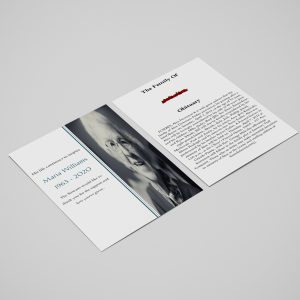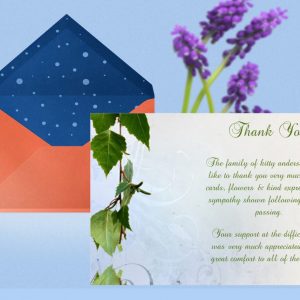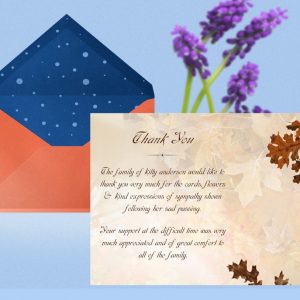Losing a loved one is an emotional and challenging experience. During such times, the support of friends and family is invaluable. One way to show appreciation for their kindness, condolences, and support is through thank you cards for funeral services. These cards are a thoughtful gesture that acknowledges the comfort and help received during a difficult period. This guide provides insights into crafting heartfelt thank you cards, ensuring your message is both sincere and appropriate.
The Importance of Sending Thank You Cards
Sending thank you cards after a funeral service is a traditional yet meaningful way to express gratitude. These cards serve several purposes:
- Acknowledgment: They acknowledge the efforts and support of those who offered condolences, attended the funeral, sent flowers, or provided meals.
- Closure: Writing thank you cards can also help in the grieving process, providing a sense of closure by reflecting on the kindness received.
- Memorial: It serves as a lasting memento for those who were close to the deceased, reminding them of the shared memories and mutual support.
When to Send Thank You Cards
It’s best to send thank you cards within two to three weeks following the funeral service. However, if this timeframe is too overwhelming, it’s acceptable to send them within a month or as soon as you’re able. The important thing is the sincerity of the gesture, not the timing.
Who Should Receive Thank You Cards?
Consider sending thank you cards to:
- Pallbearers and Clergy: Those who played a significant role in the service.
- Friends and Family: Individuals who attended the funeral, sent flowers, donations, or provided meals and support.
- Service Providers: Funeral directors, musicians, or anyone who contributed to the service.
What to Include in a Thank You Card
A well-crafted thank you card for a funeral service should be personalized and heartfelt. Here’s a simple structure to follow:
Opening Greeting: Start with a greeting such as “Dear [Name],” or “To [Name],”
Expression of Gratitude: Begin by expressing your thanks for their specific act of kindness. For example:
- “Thank you for attending the service and sharing your beautiful memories of [Deceased’s Name].”
- “We appreciate the lovely flowers you sent; they brought beauty and comfort to a difficult day.”
Personal Touch: Include a personal note or memory if possible. This makes the message more intimate and meaningful.
- “Your stories about [Deceased’s Name] made us smile and remember the good times.”
Closing: End with a warm closing such as:
- “With heartfelt thanks,”
- “Sincerely,”
Then sign your name or the name of your family.
Examples of Thank You Card Wording
Here are some examples of wording you can use:
For Attendees: “Dear [Name],
Thank you for attending [Deceased’s Name]’s funeral. Your presence and kind words provided comfort during this difficult time. We are grateful for your support and the wonderful memories you shared.
Sincerely, [Your Name/Family]”
For Flowers and Donations: “Dear [Name],
Your beautiful flower arrangement brought warmth and beauty to [Deceased’s Name]’s service. We deeply appreciate your kindness and generosity during this time.
With gratitude, [Your Name/Family]”
For Pallbearers: “Dear [Name],
Thank you for serving as a pallbearer at [Deceased’s Name]’s funeral. Your support and willingness to help carry [his/her] memory meant so much to us.
Warm regards, [Your Name/Family]”
Choosing the Right Design for Your Thank You Cards
The design of the thank you card can reflect the personality of the deceased or the tone of the funeral service. Here are some tips for choosing the right design:
- Simple and Elegant: For a classic and respectful tone, choose simple designs with muted colors and elegant fonts.
- Personalized Elements: Consider adding a photo of the deceased or a symbol that was meaningful to them.
- Religious Symbols: If the deceased had strong religious beliefs, you might include a symbol or verse that reflects their faith.
Tips for Writing Thank You Cards
- Be Sincere: Write from the heart, and don’t worry about crafting the perfect message.
- Keep It Brief: While it’s important to be sincere, it’s also okay to keep your message short and to the point.
- Consider Pre-Printed Messages: If writing each card individually feels overwhelming, consider pre-printed cards with a space for a personal note.
Ordering and Sending Thank You Cards
- Order Enough Cards: Estimate the number of people you’ll need to thank and order a few extra, just in case.
- Addressing Envelopes: Handwrite the addresses if possible, as it adds a personal touch.
- Timeliness: Aim to send the cards within a few weeks, but understand that people will appreciate them whenever they arrive.
Funeral Thank You Card Templates
-
Searching for a Simple Funeral Thank You Card Template that is easy to print and amass and that has a cutting-edge look? This Simple Funeral Thank You Card Template is the Perfect decision that is having a measure of 8.5”x 5.5”.
- No Limitation on Content, Edit anything
- Edit anytime – unlimited revisions even after purchased
- Get printable PDF downloaded to get it printed your own.
-
Searching for a Green Leaf Thank You Card template that is easy to print and amass and that has a cutting-edge look? This Green Leaf Thank You Card Template is the Perfect decision that is having a measure of 5.5”x 8.5”.
- No Limitation on Content, Edit anything
- Edit anytime – unlimited revisions even after purchased
- Get printable PDF downloaded to get it printed your own.
-
Searching for a Natural Thank You Card Template that is easy to print and amass and that has a cutting-edge look? This Natural Thank You Card Template is the Perfect decision that is having a measure of 5.5”x 8.5”.
- No Limitation on Content, Edit anything
- Edit anytime – unlimited revisions even after purchased
- Get printable PDF downloaded to get it printed your own.
-
Searching for a Pink Rose Thank You Card Template that is easy to print and amass and that has a cutting-edge look? This Pink Rose Thank You Card Template is the Perfect decision that is having a measure of 5.5”x 8.5”.
- No Limitation on Content, Edit anything
- Edit anytime – unlimited revisions even after purchased
- Get printable PDF downloaded to get it printed your own.
-
Searching for a Autumn Thank You Card Template that is easy to print and amass and that has a cutting-edge look? This Autumn Thank You Card Template is the Perfect decision that is having a measure of 5.5”x 8.5”.
- No Limitation on Content, Edit anything
- Edit anytime – unlimited revisions even after purchased
- Get printable PDF downloaded to get it printed your own.
-
Searching for a Floral Thank You Card Template that is easy to print and amass and that has a cutting-edge look? This Floral Thank You Card Template is the Perfect decision that is having a measure of 5.5”x 8.5”.
- No Limitation on Content, Edit anything
- Edit anytime – unlimited revisions even after purchased
- Get printable PDF downloaded to get it printed your own.
-
Searching for a Irish Green Thank You Card Template that is easy to print and amass and that has a cutting-edge look? This Irish Green Thank You Card Template is the Perfect decision that is having a measure of 5.5”x 8.5”.
- No Limitation on Content, Edit anything
- Edit anytime – unlimited revisions even after purchased
- Get printable PDF downloaded to get it printed your own.
Funeral Programs : Helping Videos
Frequently Asked Question Thank You Card For Funeral Service
How long should the thank you note be?
Keep it concise but heartfelt. A few sentences expressing your gratitude and a personal touch are sufficient.
Can I send thank you cards via email?
While traditional mailed cards are more personal and appreciated, sending a thank you email is acceptable, especially if it’s more convenient or if you’re addressing a large number of people.
Is it necessary to send thank you cards to everyone who attended the funeral?
It’s considerate to thank everyone who made an effort, but focus on those who provided specific support, sent flowers, or made donations.
Can I include a photo in the thank you card?
Yes, including a photo of the deceased can add a personal and touching element to the card.








